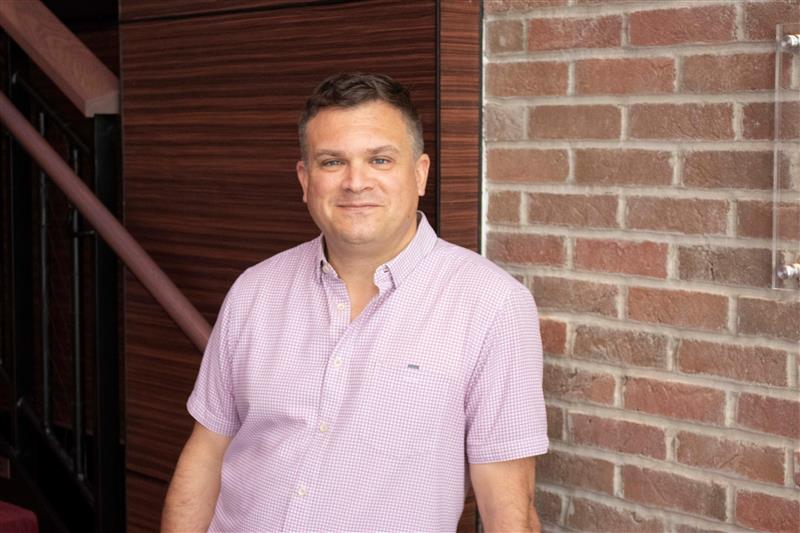
Beloved for producing works of the American canon, in recent years Round House Theatre artistic director Ryan Rilette has been on a quest for new plays and new voices.
The theater, which began operations in 1978, remains one of Montgomery County’s venerable professional theater companies, and with a budget of about $6 million and a recently renovated 350-seat theater, it’s a powerhouse arts organization on the local scene. About 50,000 people come through its doors each year.
Finding and producing works by new voices is integral to Round House’s ethos, said Rilette. “That ties into our mission, which is to give a voice to folks who haven’t traditionally been featured on American stages and to build a theater that is reflective of the community that we serve.”
He added that when he signed on as the Bethesda theater’s artistic director a decade ago, “I actually pitched a new play festival to the board.”
While it’s taken 10 years to realize, and most recently rescheduled because of a global pandemic, the National Capital New Play Festival runs April 5 through May 8, in Round House’s downtown Bethesda theater. Producers and artistic directors from around the country are coming in to view the new works and Rilette hopes to make the region a hub for new play productions that particularly express the nation’s growing diversity.
“Our area is maybe one of the most diverse communities in America,” Rilette pointed out. “We’re trying to produce plays that reflect that so that everybody can see themselves on stage in some way.”
And demographic surveys back him up: Montgomery County became majority minority in about 2010, and recent reports state the breakdown is 45 percent white, 18 percent Black, 19 percent Hispanic and 18 percent other races and ethnicities.
Naysan Mojgani, the theater’s associate artist and literary manager, added, “Our society has really had to give some serious thought to how we function from a standpoint of equity, diversity and inclusion … over the last several years. The outcome of that introspection has been the recognition that we need to think about who is telling our stories. Obviously, traditionally a lot of the stories that we see on our stages have been written by a lot of white men.”
At just a year into his tenure at Round House, Mojgani takes the lead in shepherding new plays to the stage and leading the team in reviewing scripts, both unsolicited and requested by the literary staff. With Rilette, Mojgani and other artistic staff, this group reads hundreds of new plays each year, sometimes four to five a week, then they discuss which will fit into Round House’s mission and satisfy its audience. In seeking new voices, new approaches and compelling subjects for the sophisticated audience Round House serves, Mojgani said, “We’re not just looking for plays as part of our regular season selection choices, but also for plays that are still in process and are looking for a premier home and maybe a bit of development work.”
That’s where Round House aims to make its mark nationwide — launching new plays and playwrights in the hopes that these world premieres and staged readings will find their way to theater seasons around the country in subsequent years.
“The thrust behind our new play festival is to help create the new canon,” Rilette said. “This is done at major theaters throughout the country, throughout the world, and we don’t have one in this area, despite the fact that we are one of the largest theater markets in the country.” He looks ahead to producing two world-premiere plays every year, accompanied by developmental play readings, performed with scripts in hand, to allow playwrights to hear and see if their funny lines draw laughs and dramatic moments don’t cause rustling of programs.
On the main stage
This year, on the main stage, Majgani is looking forward to Charly Evon Simpson’s heartwarming “it’s not a trip it’s a journey,” an introspective look at friendship between four women who take an impromptu road trip to the Grand Canyon.
“I first read that script several years ago in earlier versions,” Majgani said. “Whatever your gender, whatever your ethnicity, there’s a lot of healing potential, a lot of release in this play.” And because he’s followed its evolution, he terms the ending “fantastic” — though no spoilers here. “It was a good play before,” he said. “Now it’s fantastic.”
Rilette with Jared Mezzocchi directs Tim J. Lord’s political thriller “We declare you a terrorist …” based on the tragic episode of the Dubrovska Theater, when in 2002 Russian President Vladimir Putin tried to quell rebellion in Chechnya and Chechen insurgents hijacked the theater, holding nearly the entire audience hostage.
Rilette recently spoke to the playwright about doing a play with Putin as a character, and Lord said, “It’s always going to be the right time to do a play about Putin.” The director added, “With Putin that’s true … . Ultimately, though, [the play] is not so much about Putin as much as it is about what happens when you disagree with your government. Or what happens when you start to realize that the narrative that you’ve been told is not true.” And that, too, is a story that never feels out of date.
Artist associate Majgani added, “As a theater artist, you always want your work to be relevant, but there are times where I know a work to be this relevant … I could do it a little less relevance in some cases.”
Developmental readings
Beyond the mainstage premieres, the four developmental readings, which run between April 28 and May 8, feature family stories, whether that entails a traditional family, or a created one.
“Adia and Clora Snatch Joy,” by Mfoniso Udofia, tells a multi-generational story of a family of Nigerian immigrants, the struggles and triumphs, along with original music by Udofia and Nehemia Luckett.
And Mary Kathryn Nagle’s “On the Far End” is a one-woman show tracing family history through the notorious Trail of Tears.
Rilette is always ready to observe Round House Theatre’s lively and responsive audiences when they take in new or less familiar works. “What makes this audience so special is that because of living in proximity to D.C., and the careers that people have here, makes [audiences] want to have deep, deep conversations with us about the meaning of the plays, how they intersect with the world and what the playwright is saying. That is unique here at Round House, and one of the things that makes this area very, very special.”




